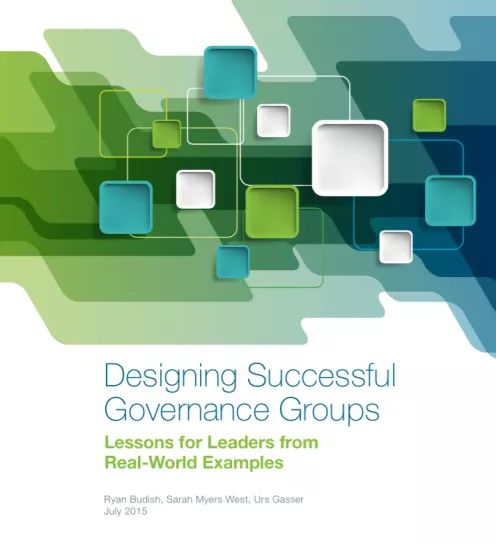
Designing Successful Governance Groups
Lessons for Leaders from Real-World Examples
The Berkman Center for Internet & Society, together with the Global Network of Internet and Society Research Centers (NoC), is pleased to announce the release of a new publication, “Designing Successful Governance Groups: Lessons for Leaders from Real-World Examples,” authored by Ryan Budish, Sarah Myers West, and Urs Gasser.
Solutions to many of the world's most pressing governance challenges, ranging from natural resource management to the governance of the Internet, require leaders to engage in multistakeholder processes. Yet, relatively little is known how to successfully lead such processes. This paper outlines a set of useful, actionable steps for policymakers and other stakeholders charged with creating, convening, and leading governance groups. The tools for success described in this document are distilled from research published earlier this year by Berkman and the NoC, a comprehensive report entitled “Multistakeholder as Governance Groups: Observations From Case Studies,” which closely examines 12 examples of real-world governance structures from around the globe and draws new conclusions about how to successfully form and operate governance groups.
This new publication, “Designing Successful Governance Groups,” focuses on the operational recommendations drawn from the earlier case studies and their accompanying synthesis paper. It provides an actionable starting place for those interested in understanding some of the critical ingredients for successful multistakeholder governance.
At the core of this paper are three steps that have helped conveners of successful governance groups:
Establish clear success criteria
Set the initial framework conditions for the group
Continually adjust steps 1 and 2 based on evolving contextual factors
The paper explores these three steps in greater detail and explains how they help implement one central idea: Governance groups work best when they are flexible and adaptive to new circumstances and needs and have conveners who understand how their decisions will affect the inclusiveness, transparency, accountability, and effectiveness of the group.
The paper, as well as the research it builds upon, is intended as a contribution to emerging good and best practices in Internet governance and is offered as a submission to the IGF Best Practice Forum and the NetMundial Initiative, among other forums.
About the Berkman Center for Internet & Society:
Since its founding in 1997, the Berkman Center has been at the forefront of the field of Internet and Society, pursuing a unique mix of interdisciplinary scholarship and engagement with legal and policy issues. Our diverse community shares a commitment to tackle the most important challenges of the digital age, to think big, to act with ambition and humility, and to maintain academic rigor while keeping a focus on tangible real-world impact. As a University-wide Center, Berkman informs and engages in the public interest through conducting research, building tools and platforms, education, and creating and cultivating networks. More information can be found at http://cyber.harvard.edu.
About the Global Network of Internet and Society Research Centers
The Global Network of Internet and Society Research Centers (NoC) was launched by a group of academic centers – including the Berkman Center - in 2012 in recognition of the lack of internationally coordinated research and engagement activities in issues concerning the Internet and related technologies. The NoC is a collaborative initiative among academic institutions with a focus on interdisciplinary research on the development, social impact, policy implications, and legal issues concerning the Internet. This collective aims to increase interoperability between participating centers in order to stimulate the creation of new cross-national, cross-disciplinary conversation, debate, teaching, learning, and engagement regarding the most pressing questions around new technologies, social change, and related policy and regulatory developments. More information can be found at http://networkofcenters.net/about.


